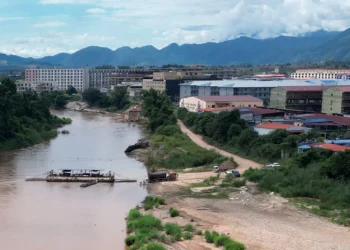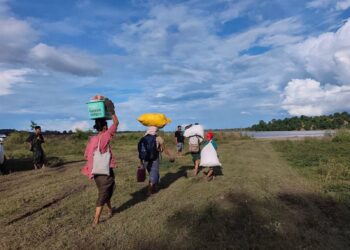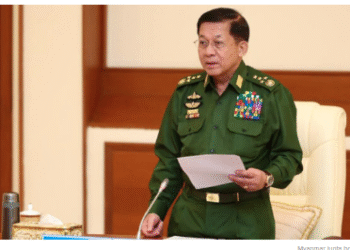The Myanmar military is punishing civilians as the Arakan Army closes in on the Rakhine capital, pushing thousands to flee the state while those left behind face a growing humanitarian crisis.
By ANT PWEH AUNG | FRONTIER
Reaching Yangon wasn’t easy. While her husband stayed behind in war-torn Minbya town to look after their house and grocery store, Daw Nyein Nyein Zan* and the rest of her family – including her two-year-old son and one-year-old niece – began a monthslong journey to flee Rakhine State.
They and nearly all the town’s population of 40,000 had been displaced by fighting between the Arakan Army and Myanmar military after an informal ceasefire collapsed in November. The AA has since seized control of large swathes of the state, including Minbya town, which finally fell in February.
Nyein Nyein Zan, who was two months pregnant in November, first relocated to a camp for internally displaced people in a nearby AA-controlled village. But the 29-year-old saw this as a temporary fix. For the sake of her unborn child, she was intent on getting to Yangon and giving birth in a more stable environment and in a functioning hospital.
“Almost everyone in my native town had to leave their homes to escape the war,” Nyein Nyein Zan told Frontier. “Even if I stayed in the village where we first fled, I’d always be worried about military airstrikes. I was about to give birth, so I decided to risk my life to come to Yangon.”
But first they had to reach the state capital Sittwe, a simple task in times of peace, but not so today. Roads, where military checkpoints have proliferated, were out of the question. But many parts of Rakhine are connected by a complex web of waterways, as the Bay of Bengal infiltrates the west coast of Myanmar. They got on a sampan in Myaung Bway town, taking the low wooden boat through one of these inland waterways to Kyauk Seik village, near Ponnagyun town.
It was a three hour journey, made all the more terrifying by the military’s attempts to blockade these small water routes to prevent the AA from moving troops and supplies.
“The journey to Sittwe by sampan was very dangerous indeed,” Nyein Nyein Zan said. “We could have died at any moment if the boat overturned. And we were exposed. The whole trip I was worrying about whether we’d encounter the navy.”
After they reached Kyauk Seik, they took a truck to Ponnagyun town, spent a night with relatives and then boarded another truck to Tan Zwei village. From there, it was back on a sampan for another hour to Sittwe, which they reached on December 15.
“I felt relief only when my family arrived safely in Sittwe,” she said.
Before the resumption of hostilities, a plane ticket from Sittwe to Yangon cost K135,000, around US$35 at the market rate. But with so many people trying to flee the state, prices have skyrocketed. Nyein Nyein Zan and her family paid K400,000 for each ticket, and weren’t able to actually get a seat on a plane for another month.
Nyein Nyein Zan was lucky to escape. The majority of IDPs have nowhere to go, and are in urgent need of food, medicines, healthcare and other humanitarian aid, according to local charity groups. The military has routinely deployed crippling blockades during previous rounds of fighting in Rakhine, in an attempt to cut off the AA from supplies. It appears to be using the same tactic this time around, once again having major repercussions for the civilian population.
“Almost all IDPs are in need,” said Ko Trun Aung*, a member of the Arakan Responders for Emergency, a local NGO that provides rice and blankets to displaced people throughout the state.
“The first challenge they face is food and shelter, and medicines are blocked as well.”
Life under the blockade
Since the return of war in November, the AA has seized 10 towns, including Paletwa in neighbouring southern Chin State. As the armed group closes in on Sittwe, the junta is ramping up airstrikes and artillery bombardments across the state, deepening the humanitarian crisis.
AA spokesperson Khaing Thu Kha told Frontier that the conflict displaced more than 300,000 people between November 13 and March 13, based on figures from the group’s Humanitarian and Development Coordination Office.
“The number of displaced people in the state is steadily increasing day after day,” he said.
He said that the main needs for IDPs are food and nutrient supplements, medicines and medical equipment, temporary shelters, construction materials, livelihood assistance and landmine clearance equipment.
“We are currently experiencing a shortage of medicine. This is because the terrorist military council has blocked all the roads that come from other parts of the country to Rakhine State. They have cut off the medical supplies and basic food,” Khaing Thu Kha said.
A resident of Sittwe told Frontier that the junta has also blocked off water ways for civilian vessels, and is now using them to send reinforcements north to Buthidaung and Maungdaw townships.
“All waterways are completely closed, including for fishing boats, and the Myanmar military said that they would fire at any vessel they see,” she said. “IDPs from the war-torn townships in northern Rakhine can no longer come to the main general hospital in Sittwe for health emergencies.”
An IDP from Minbya Township said transportation blockages by the junta mean that many medicines are not available, and those that can be found have surged in price. As of mid-March, the price of a single 500-milligram tablet of pain and fever medicine Biogesic had increased from K1,500 to K3,500. Meanwhile, the price of a 24-pyi bag (51 kilograms) of rice jumped from K150,000 to K220,000.
The severing of regional routes and waterways is part of the junta’s enforcement of its infamous “four cuts” strategy, aimed at denying armed groups access to food, funds, information and recruits. The regime has also cut the internet and phone lines in conflict areas, making it difficult to get information out.
Ko Than Tun*, a 37-year-old farmer from Rathedaung Township, where the connectivity has been cut, spoke to Frontier from Ponnagyun Township, where he had gone to retrieve rice.
He was displaced from his ward in Rathedaung town in January, when the AA began an assault on a nearby military base. Than Tun alleged that the regime responded by intentionally torching more than 100 civilian homes in his neighbourhood. He and his wife have taken shelter at a nearby village, but said there is a lack of food, medicines, clean drinking water and materials to build shelters.
“When the war broke out, local aid groups weren’t active here yet, so the IDPs had a lot of difficulties,” Than Tun said.
Some IDPs facing health emergencies have taken great risks to travel across conflict zones to AA-controlled villages, some of which have functioning clinics, although many of them face their own challenges.
Humanitarian aid denied
As a result of the AA’s territorial gains, many state-run health centres are now in areas outside of the regime’s control. Some have stopped working entirely, while others have disobeyed regime orders to continue providing care.
An official from the regime’s health ministry in Minbya Township told Frontier that all ministries have ordered their staff to relocate from AA-controlled townships to Sittwe before March 31, or their salaries will be forfeited.
“In Rakhine State, most government staff are ethnic [Rakhine] people. Very few staff will go to Sittwe. I made up my mind that I won’t go to Sittwe due to security concerns,” she said.
Repeated attempts by Frontier to reach Dr Kyi Lwin, head of the regime’s Rakhine State public health department, were unsuccessful.
Khaing Thu Kha told Frontier that the AA’s health department is providing medicine and healthcare to IDPs “as best as we can” and has left the door open to regime healthcare workers to switch sides.
“If medical personnel who have previously worked under the military council are willing to participate in our rehabilitation processes, we will welcome them,” he said.
Khaing Thu Kha said that the most common ailments among IDPs in Rakhine are skin diseases such as scabies, as well as diarrhoea and common colds, which can prove life threatening to the young and elderly if untreated. Volunteers at local charity organisations said the majority of IDPs also faced shortages of drinking water.
Despite this growing need, regime restrictions have hobbled international and domestic non-government organisations trying to reach people.
Khaing Thu Kha told Frontier that almost all the international organisations based in Rakhine have left.
“The terrorist military council has restricted the movement of INGOs. Although they want to help the war-displaced people, they are not allowed to go to conflict areas. That’s why they have returned to Yangon,” he said. “The international community should help the IDPs who are currently suffering because of the war, but not through the military council. They should use other means like cross-border aid. It will be of great help to our people who are suffering now.”
A staff member at an INGO working in Rakhine confirmed to Frontier that his organisation’s programmes to help IDPs have been suspended because they weren’t granted permission to travel by the military regime. He requested to withhold the name of his organisation for security reasons.
“In the future, when we think about providing humanitarian aid to AA-controlled townships in Rakhine State, we need to consider whether to cross the border through Bangladesh to reach people. Another way is to help through local civil society organisations,” he said.
Trun Aung, from the Arakan Responders for Emergency, said his group is still operating, but their ability to offer support is limited.
“Since we are on the ground, we can provide a little support for IDPs, but we can’t carry medicines,” he said, explaining that they can deliver rice and blankets, but the regime is particularly strict about transporting medical supplies.
In the meantime, many IDPs from territory seized by the AA are still too afraid to return home, due to the threat of airstrikes, artillery and landmines. Khaing Thu Kha said in the first three months of fighting, 111 Rakhine civilians were killed. He did not give numbers for Rohingya, who have also been caught in the middle of the clashes.
“We are all waiting for the situation to return to normal,” said Nyein Nyein Zan, speaking from Yangon’s South Okkalapa Township, where she is living with relatives until she gives birth.
“Once the situation calms down and the roads are reopened, I will return home as fast as I can.”
*indicates the use of a pseudonym for security reasons






